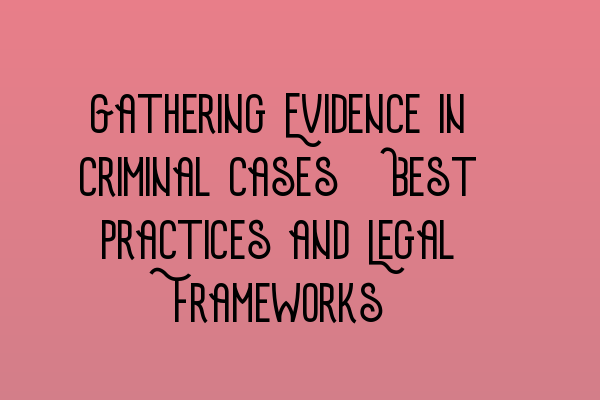Gathering Evidence in Criminal Cases: Best Practices and Legal Frameworks
When it comes to criminal cases, gathering evidence is crucial in ensuring a fair and just legal process. The collection and presentation of evidence can significantly impact the outcome of a case, making it imperative for legal professionals to understand and employ best practices within the legal frameworks.
Legal Framework for Gathering Evidence
The legal framework for gathering evidence in criminal cases is designed to protect the rights of both the accused and the prosecution. It ensures that evidence is obtained lawfully and that its admissibility in court is properly assessed. Understanding the legal framework is essential for solicitors, as it guides them in the collection and presentation of evidence.
One important aspect of the legal framework is the admissibility of evidence. Only evidence that is obtained legally and is relevant to the case can be admitted in court. This prevents the use of unlawfully obtained evidence, which could jeopardize the fairness of the trial.
Another key aspect of the legal framework is the chain of custody. Solicitors must ensure that the evidence is properly handled and documented from the moment it is collected until it is presented in court. This ensures its integrity and reliability, as any break in the chain of custody can raise doubts about its authenticity.
Best Practices for Gathering Evidence
To ensure the effective gathering of evidence in criminal cases, solicitors should follow best practices that align with the legal framework. These best practices include:
- Thoroughly documenting the crime scene: When collecting evidence from a crime scene, it is crucial to thoroughly document and photograph the area. This documentation can serve as valuable evidence in court and help establish the context of the crime.
- Interviewing witnesses and parties involved: Solicitors should conduct thorough interviews with witnesses and parties involved in the case. This helps gather firsthand accounts and clarifies any inconsistencies in statements.
- Obtaining expert opinions: In complex cases, solicitors may seek expert opinions to interpret and analyze evidence. These opinions can provide a deeper understanding of the evidence and strengthen the case.
- Using technology for forensic analysis: Technology plays a vital role in modern forensic analysis. Solicitors should leverage advanced tools and techniques to analyze DNA, fingerprints, digital evidence, and more.
- Ensuring compliance with data protection laws: When gathering evidence that involves personal data, solicitors must comply with data protection laws to protect the privacy and rights of individuals involved.
By following these best practices, solicitors can effectively gather evidence that meets the legal requirements and withstands scrutiny in court.
Conclusion
Gathering evidence in criminal cases requires a comprehensive understanding of the legal frameworks and adherence to best practices. Solicitors play a crucial role in ensuring that evidence is collected lawfully and presented effectively in court. By integrating these practices into their workflow, solicitors can contribute to the fairness and integrity of the criminal justice system.
For more information on related topics, please check out the following articles:
- Demystifying the Solicitors Qualifying Examination Format
- LLC Formation Made Simple: Step-by-Step Guide for UK Entrepreneurs
- Business Regulations in the UK: A Comprehensive Overview
- Preparing for the SQE Exam: Strategies and Resources for Success
- SQE Workshops and Webinars: Accelerate Your Exam Preparation
